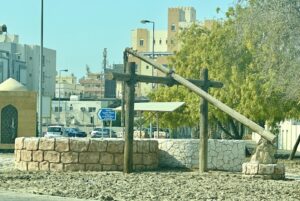Nestled within the arid landscape of Bahrain, an ancient tradition continues to sustain life—fetching water from wells. Long before modern infrastructure brought desalination plants and pipes to the island, the people of Bahrain relied on wells to access the life-giving water hidden beneath their sandy land. These wells are not only functional but also deeply woven into Bahrain’s cultural fabric, a testament to the ingenuity and resilience of its people in the face of harsh desert conditions.
Bahrain, meaning “two seas” in Arabic, historically referred to the island’s fresh underground water juxtaposed against the surrounding salty sea. For centuries, the discovery and use of wells were vital for survival. Bahrain’s unique geological features included a layer of limestone that allowed freshwater springs to emerge from underground aquifers. These springs, often linked to historic wells, provided Bahrainis with clean water for drinking, farming, and daily needs in a landscape that would otherwise have been inhospitable.
Communities in Bahrain would gather around these wells, making them social hubs as well as critical sources of water. Families would use buckets tied to long ropes, lowering them deep into the earth to bring up cool, refreshing water. This wasn’t merely a task but a communal activity, one that reflected the values of sharing and cooperation that still resonate in Bahraini society today.
The tradition of well-digging also carries spiritual significance. Water is seen as a divine blessing in the Quran, and the act of digging for water was often accompanied by prayers and ceremonies, asking for protection and success in securing the precious resource. In the desert, the presence of a well was a sign of hope, life, and prosperity. Bahrain’s wells are not only practical marvels but also relics of human perseverance.
Though modern water sources have largely replaced the need for wells, many of these ancient structures remain, preserved as heritage sites. They are silent witnesses to a time when water was more than a convenience—it was a vital treasure. Today, they remind us of the deep connection between people and the land they inhabit, and how Bahrain’s history has been shaped by the search for water.
As Bahrain moves forward, balancing development with conservation, these wells stand as symbols of sustainability and respect for natural resources. They are a call to remember that even in a world of abundance, we should never take life’s essentials for granted.

